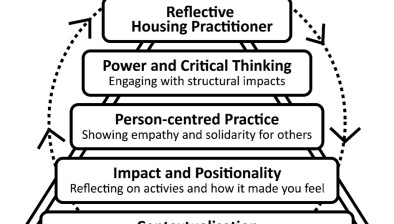Carole Ewart: Capitalising on the human right to housing
RSLs must embrace the opportunity provided by the new Regulatory Framework to comply with human rights legislation, writes Carole Ewart.

The Scottish Housing Regulator’s new Regulatory Framework repeats the requirement on social landlords to promote and comply with human rights legislation as well as equalities legislation. Considering issues though a human rights lens and making decisions which comply with human rights law is an opportunity to be seized: working collectively we are strengthened in our demand for the construction of more accessible and affordable houses; acting individually, RSLs serve tenants everyday by respecting their right to ‘home’ as defined by the European Convention on Human Rights (ECHR) which could include addressing anti-social behaviour caused by owners letting out their home at weekends to tourists.
The Equalities and Human Rights Commission encourages RSLs to understand the enormity of the work they are involved in as housing is a gateway to the equal enjoyment of a raft of rights:
“Human rights have special significance in relation to social housing. Quality of housing can have a huge impact on wellbeing. Inadequate housing increases the risk of severe ill health and disability; it can also lead to poor mental health, lower educational attainment, unemployment and poverty.”
Whilst many people readily admit to supporting human rights globally, there is a shyness about admitting responsibility for local delivery and in some cases outright hostility. Understanding what staff and board members think about human rights is key to getting the culture, practice and solutions right. In 2017, the Scottish Human Rights Commission (SHRC) hired YouGov to gauge opinion by conducting an online survey of 1,500 (16+) people and the results shook some comfortable assumptions: 42% were supportive, 30% conflicted, 13% opposed, 14% disengaged and a sizeable 45% did not know what word to associate with human rights. So, when asking staff to deliver rights and board members to make decisions, it is important that there is a shared understanding of what that means in theory as well as practice for social housing.
When we have the language and understanding right there are national opportunities to make a local impact:
- The First Minister has undertaken to set up a Task Force to deliver on the report from her Advisory Group on Human Rights Leadership ‘Recommendations for a new human rights framework to improve people’s lives’. The seven recommendations include that there should be ‘Capacity-building… to improve people’s lives.[1] This strategic development follows previous statements and commitments including that Scotland needs to actively consider how to give domestic effect to the UN’s International Covenant on Economic, Social and Cultural Rights which includes the right to housing as part of a suite of rights on income, food and clothing which are deemed essential for human dignity and must be progressively delivered by elected governments to the maximum extent of available resources.
- The November 2018 report from the Equalities and Human Rights Committee ‘Getting Rights Right – Human Rights and the Scottish Parliament’ which made 40 recommendations including that the ‘Scottish Parliament should be an international leader in human rights and adopt procedures that ensure best practice becomes standard practice’.[2]
Despite all of this domestic human rights noise, there remains a problem with explicit delivery. When were you last at a meeting where people discussed funding for social housing in terms of the State’s obligation under international human rights law? Or decisions on factoring services as key to delivering on the ECHR duty to enable people to enjoy their home ownership?
The UN recognises the pressures on organisations to compromise on basic standards to fit funding allocations and that staff and volunteers are challenged when standing up for individual rights. However human rights should not be compromised to satisfy political agendas as was forcefully put by the UN’s Special Representative on Extreme Poverty, Professor Phillip Alston, in his initial report of his visit to the UK in November 2018 – ‘it seems patently unjust and contrary to British values that so many people are living in poverty’.[3]
The UN says human rights are not negotiable and need protection, to be equally enjoyed and enforced. So, the duty to comply with regulatory standards is a welcome excuse and incentive to connect the provision of affordable, accessible and high-quality housing with human rights delivery in Scotland. Hopefully local practice on will inspire and encourage other sectors to act too.
- Carole Ewart is a public policy and human rights consultant - ewartcc.com
[1] http://humanrightsleadership.scot/wp-content/uploads/2018/12/First-Ministers-Advisory-Group-on-Human-Rights-Leadership-Final-report-for-publication.pdf
[2] https://sp-bpr-en-prod-cdnep.azureedge.net/published/EHRiC/2018/11/26/Getting-Rights-Right—Human-Rights-and-the-Scottish-Parliament-3/EHRiCS052018R6Rev.pdf
[3] https://www.ohchr.org/en/NewsEvents/Pages/DisplayNews.aspx?NewsID=23881&LangID=E








